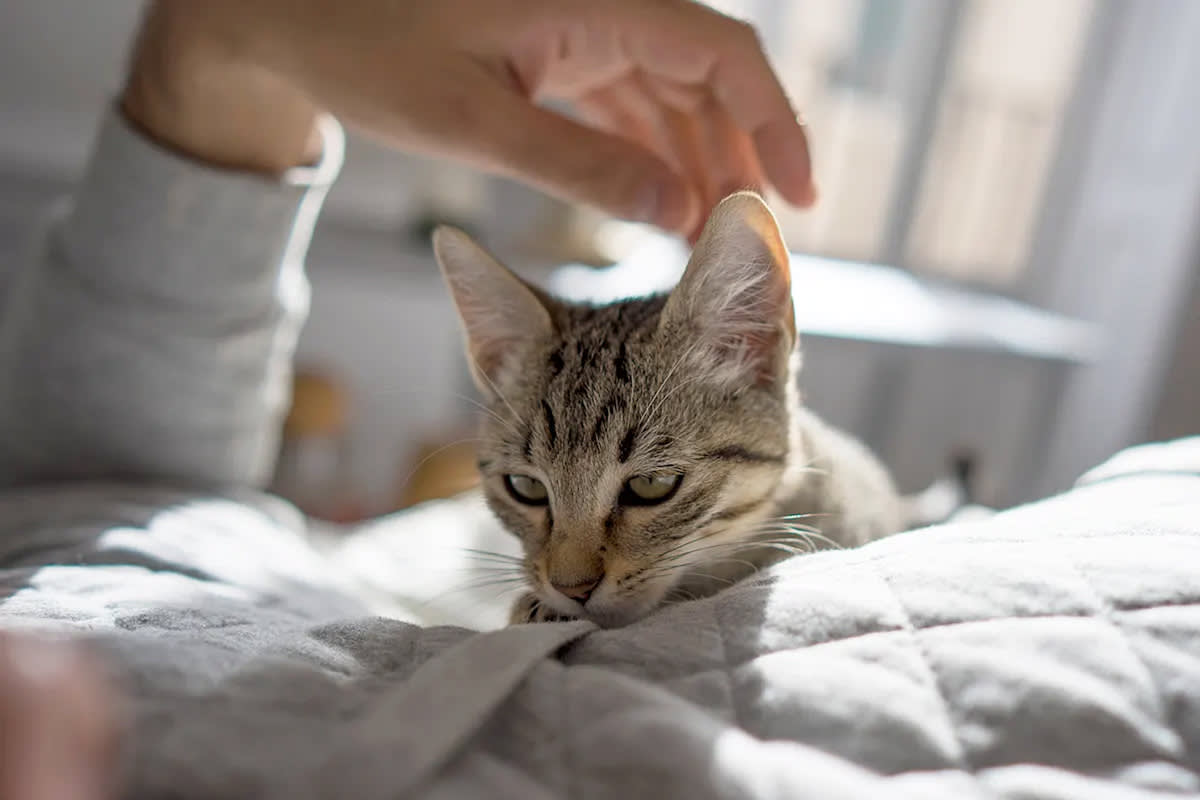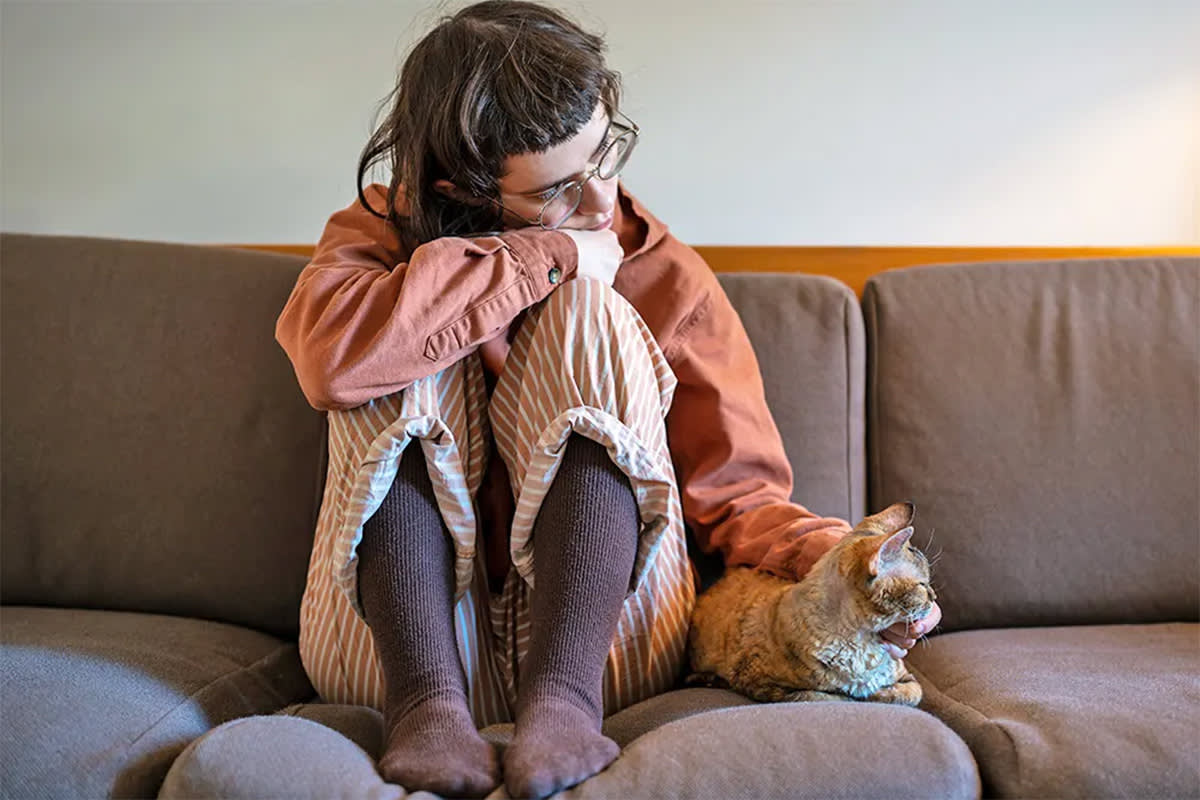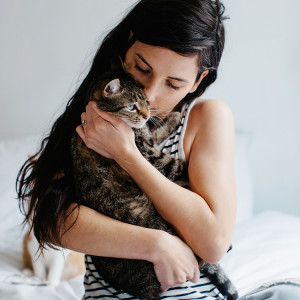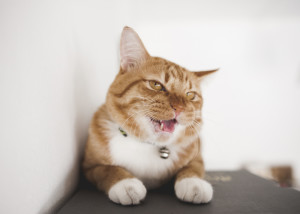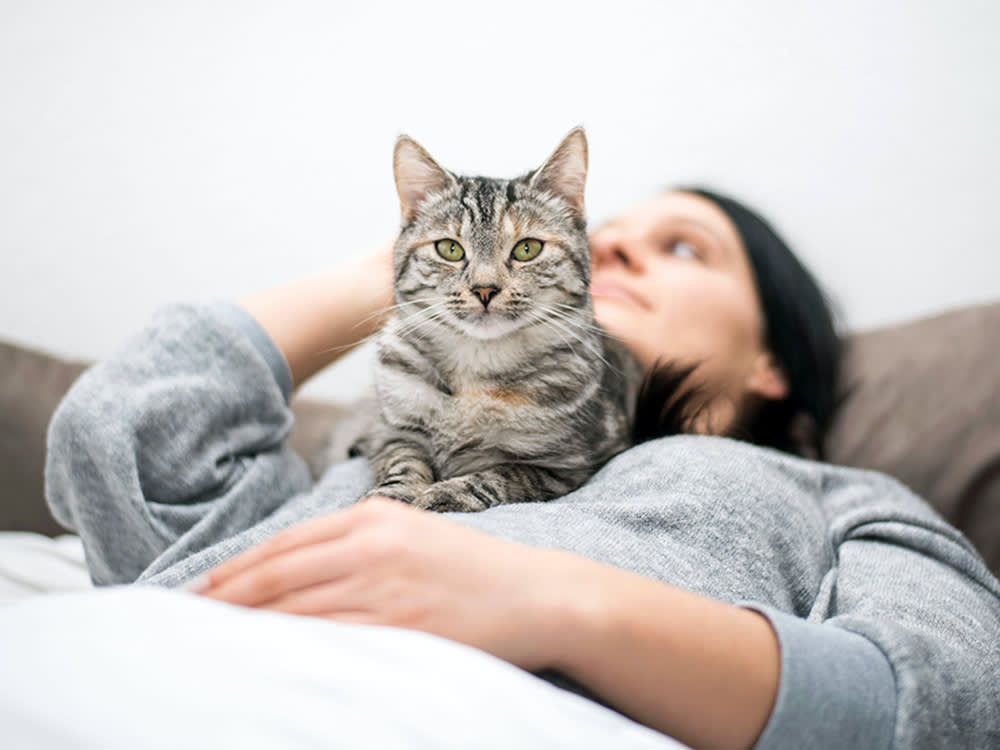
Share Article
So you’re sick. In between sniffles and naps and way too many episodes of a trashy reality TV show, you peer out of your fevered fog to notice your kitty is snuggling your feet, as if they are your nurse, hired for this exact purpose. Do they actually know you’re feeling icky, or is this show of comfort simply just a coincidence?
Although cats don’t typically have the same reputation for inter-species empathy that dogs do, many people who live with cats will swear up and down that their pets can sense changes in their human caretaker’s mood or physical condition. But is that based in fact, or are they simply reading too much into normal cat behavior?
Technically, there’s no conclusive evidence proving that cats have this ability, and very little scientific research has even been conducted on the subject. But if we examine what we do know about cats’ biology and behavior —as well as the wealth of anecdotal evidence from their humans — we can say with some confidence that cats can most likely tell when something is “off” with their pet parents.
Sniffing out disease
There have been a great deal of studies conducted on dogs’ ability to detect illness, including some cancers, Parkinson’s disease, and certain infectious diseases like malaria. Dogs can even senseopens in new tab changes in a human’s blood sugar levels, or tell when a person with epilepsy is about to seize, and are now sometimes trained as specialized companions for people living with these conditions.

Pups are able to do this mainly because their extremely powerful sense of smell enables them to pick up on slight changes in human hormone levels or the body’s release of volatile organic compounds (VOCs).
Although a cat’s sense of smell is admittedly less powerful than a dog’s, they’re still well known for having very keen olfactory abilitiesopens in new tab and are capable of detecting a much wider range of scents than a human. So though the direct research on the subject is still lacking, there’s a strong consensus that cats can sense these VOCs (and other olfactory markers of illness) the same way dogs can. “Cats do pick up on hormonal changes and changes in your body smell,” feline behaviorist Rita Reimersopens in new tab says. “They’ve got so many more olfactory cells than we have.”
Changes in routine
In addition to being super-smellers, cats are very observant creatures. They prefer reliable routines, and are quick to notice when anything is out of the ordinary in their territory. “Cats like predictability,” Reimers says. “So, when things happen that are out of the norm, they definitely sense it.” When you’re sick, you may spend more time resting than usual, and may also slack off a bit on timely pet feedings and daily litter box scoopings — both changes that your cat is sure to notice.
Plus, practically speaking, the increased time you’re spending at rest means your cat has more opportunities than usual to snuggle you, so they may just be taking advantage of that. “You’re laying on the sofa more or the bed more, so they’re gonna come cuddle up next to you,” Reimers says. “They’re trying to comfort you in a sense, but I really think it’s just that you’re more accessible to them because you’re in a state where you’re sitting still for a longer period.”
Anecdotal examples
While it’s not the same as scientific research or hard evidence, there are many anecdotal stories that suggest cats have a great deal more empathy for their sick caretakers than we give them credit for.
Perhaps the most well-known of these is Oscar, a therapy cat at a Rhode Island nursing home who seemed to be able to predict when the residents were about to die. It’s unclear whether Oscar was simply noticing a decrease in the patients’ movements or or if he could smell chemical changes in their bodies as they began to power down, but he would regularly choose to nap next to people in what would turn out to be the last few hours of their lives. It is believed that before his own passing in 2022, Oscar had accurately predicted over 100 deaths.
In another story, a woman credited opens in new tab her cat, Oggy, with helping draw her attention to a lump in her breast, which turned out to be stage-three breast cancer.
But outside of these more extreme examples, there’s hardly a cat lover out there who wouldn’t insist that their cats can tell when they’re in pain or fighting some kind of ailment. “When I had COVID, I had cats all over me,” Reimers says. “And I know that when my arthritis is acting up in my ankle, one of my cats will lay on my ankle.”
Scientifically, though the jury may still formally be out on whether your cat can tell when you’re sick, there is one thing we do know for certain: a cat’s purr has a frequency that has been shown to promote healingopens in new tab, as well as helping to reduce stress and anxietyopens in new tab.
So, though cats may not consciously know what they’re doing when they cuddle up to a sick person, we can still enjoy their natural ability to make us feel better and acknowledge that a sleepy, purring kitty on the chest is some of the best medicine you can get.

Rachel Pick
Rachel Pick is a freelance writer and social media editor who has written for Vice, The Guardian, and SELF. She lives with two cats: Cricket, a genteel lady who is the picture of refinement, modesty, and good manners; and Cowboy, who is an agent of chaos, slapstick comedy, and foul odors. Her work here frequently focuses on cat companionship and cat behavior.
Related articles
Can Cats Sense Sadness? A Guide to Their Emotional Recognition
Their reactions may surprise (or perplex) you.
![dark-haired woman hugging cat that has imprinted on her]()
10 Signs Your Cat Has Imprinted on You
Feeling like you have a little shadow these days? Here’s why that’s happening.
![a cat making a strange face with its mouth open.]()
Is Your Cat Judging You?
That disapproving sneer is actually the “Flehmen response.” A cat behaviorist explains how to read cats’ lips.
![cat staring at person on table]()
Why Does My Cat Stare at Me?
...Is it something you said?
![a tattooed person with curly red hair on a couch pets a brown and black cat]()
Your Cat Can Tell When You’re Stressed, Study Says
It’s all in their noses.
